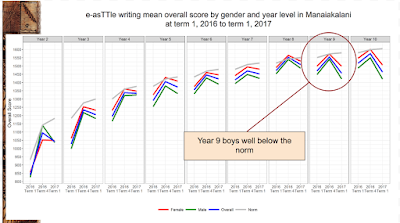During the SLE, the majority of students who signed up and participated were from the primary schools, which was fantastic. We originally had 5 students partake, but ended up having 2-3 students regularly blogging which in the scope of things is a bit sad. I wondered why this was and remembered at the end of last year 2016, we had one introduction to the programme and then sent the kids off on their merry way. In hindsight, I wish we as staff had understood the importance of the programme and had given it more time and value.
 |
| Over the summer our girl Quasia blogged regularly! |
This year, my aim to use the time in November after the seniors leave, to get students hyped up to blog over the summer holidays. I realise that we as a school needed to make more of an effort to emphasis the importance of students reading and writing over the holidays and I wondered how to motivate students to be engaged, especially our boys. At our recent school leaders PLG, Aaron Wilson alluded to a study that discussed what motivated youth to read and write outside of school. The Complex World of Adolescent Literacy: Myths, Motivations and Mysteries' found that youth like to read and write about things they can identify with.
They like to read books about people like them, and not only in terms of race, ethnicity, age, class, or gender (although these features are important). They also like to identify with characters who are resilient through struggles, people who are working through relationships, people trying to figure out who they are. They want to read books and write texts that offer them social capital in the form of information, ideas for self-improvement, models for identities, or ways to maintain existing relationships and build new ones ( Moie, Overby, Tysvaer and Morris, 2008).
This resonated with me because during our sustainability study in term 1, I found that some of my year 9's liked to talk about the issues that affected them in our community because they were living the reality. There were a group of boys in my year 9 class that really engaged with their inquiries and this showed when they presented their projects at the Te Taiao o Tamaki showcase earlier this year.
What I would like to do is to plan a unit in social studies for the end of the year, that could incorporate these aspects in the hope and model how learning could happen during the summer holidays. This way, students could be motivated to read and write more and be better prepared for the on-coming year.
Moje, E., Overby, M., Tysvaer, N., & Morris, K. (2008). The Complex World of Adolescent Literacy: Myths, Motivations and Mysteries. Harvard Education Review, 78(1), 107-154. Retrieved from https://www.ncbi.nlm.nih.gov/pmc/articles/pmid/19756223/





No comments:
Post a Comment